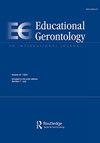中老年人自主学习量表的验证
IF 1.5
4区 教育学
Q3 EDUCATION & EDUCATIONAL RESEARCH
引用次数: 0
摘要
摘要考虑到在老龄化社会中终身学习对促进积极老龄化的重要性,参与自主学习的能力对成年人来说至关重要。有许多自我指导学习(SDL)工具可用来衡量护理学生和医疗保健专业人员的SDL能力。然而,专门为中老年人设计的SDL工具却很少。本研究的目的是检验和确认srssdl -成人量表的因子结构和内部一致性,特别是针对在老年学习中心注册的中老年成人学习者。采用横断面法。采用探索性因子分析和验证性因子分析来评估量表的结构效度。内部一致性采用Cronbach’s Alpha系数确定。结果表明,学习需求评估技能、学习计划技能、学习执行技能、自我评估技能和人际交往技能这五个因素的信度均达到可接受的水平。经修订的25项srssdl -成人量表可以有效地衡量高中教育背景下中老年人的自主学习能力。本研究的结果有可能被参与老年教育计划的教育机构和教育工作者所利用。研究人员感谢台湾国家科学技术委员会对MOST 110-2410-H-194-073-的资助。国立中正大学伦理审批。参考编号:CCUREC110051202。披露声明作者未报告潜在的利益冲突。本文章由计算机程序翻译,如有差异,请以英文原文为准。
Validation of the self-directed learning scale for middle-aged and older adults
ABSTRACTConsidering the significance of lifelong learning in advancing active aging in aging societies, the ability to engage in self-directed learning plays a crucial role for adults. There are many self-directed learning (SDL) tools available that measure the SDL abilities of nursing students and healthcare professionals. However, fewer SDL tools specifically designed for middle-aged and older adults have been developed. The purpose of this research was to examine and confirm the factor structure and the internal consistency of the SRSSDL-adult scale, specifically for middle-aged and older adult learners enrolled in senior learning centers. A cross-sectional method was adopted. Both Exploratory Factor Analysis and Confirmatory Factor Analysis were conducted to assess the structural validity of the scale. The internal consistency was determined using the Cronbach’s Alpha coefficient. The results indicated that the five factors – learning needs assessment skills, learning planning skills, learning execution skills, self-assessment skills, and interpersonal skills – showed acceptable levels of reliability. The revised 25-item SRSSDL-adult scale was found to be a valid measure of middle-aged and older adults’ self-directed learning abilities in the context of senior education programs. The findings of this study have the potential to be utilized by educational institutions and educators involved in senior education programs. AcknowledgmentsThe researchers would like to thank Taiwan National Science and Technology Council for the grant MOST 110-2410-H-194-073-.Ethical approvalNational Chung Cheng University. The reference number is CCUREC110051202.Disclosure statementNo potential conflict of interest was reported by the author(s).
求助全文
通过发布文献求助,成功后即可免费获取论文全文。
去求助
来源期刊

Educational Gerontology
Multiple-
CiteScore
2.50
自引率
13.30%
发文量
80
期刊介绍:
This well-respected journal offers up-to-date original research in the fields of gerontology, adult education, and the social and behavioral sciences. Researchers from around the world will benefit from the exchange of ideas for both the study and practice of educational gerontology. Papers published in the journal will also serve as authoritative contributions to the growing literature in this burgeoning field. Educational Gerontology is the only international journal of its kind to publish twelve issues per volume year. Articles featuring outcome-based practical educational resources in gerontology for the educational professional, care provider, trainer, and student in such areas as: art, music, drama and recreational therapies; mental health, communication arts, social programs and policies; and, social work, nursing, physical and occupational therapies, financial planners, architecture and interior design, family relations and therapy, and religion and spirituality.
 求助内容:
求助内容: 应助结果提醒方式:
应助结果提醒方式:


